'It feels paralyzing:' Dearborn resident from Gaza lost her home, fears losing family
Sara Shannan’s former Gaza City home was barely recognizable in the nighttime photo. Lit by the glow of flames and emergency lights, the concrete structure had been torn open, one part reduced to rubble, the innards of what remained standing exposed.
Still intact was the burgundy-and-white tiled kitchen where Shannan — the eldest of nine — helped her mother cook meals until four years ago, when she became the first of her relatives to emigrate to the U.S.
“Our house is gone,” the father of the 27-year-old Dearborn resident relayed via WhatsApp, Shannan’s primary connection to family in Gaza throughout the monthlong war.
Built by her grandparents, it had been home to nearly two dozen family members — each clan on a separate flat, the top floors slated for renovation so new generations could move in.
At first, Shannan was overcome with gratitude. Her family had survived by sheer miracle, escaping the surprise Oct. 9 airstrike by hours, after a “gut feeling” told them to flee, Shannan said.
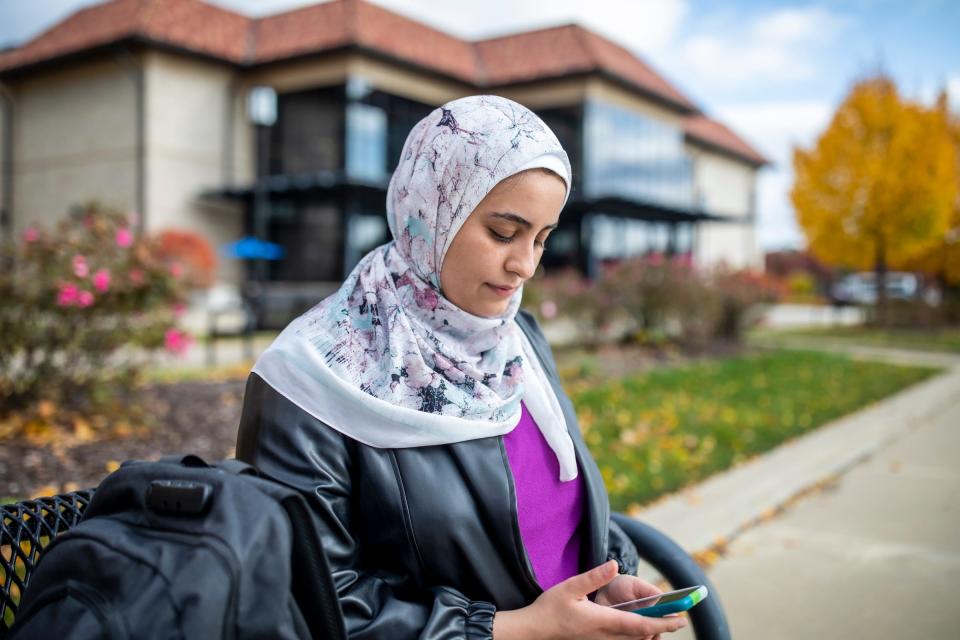
Then came a surge of panic. Her breath shortened and heart raced. She cried uncontrollably.
They could have been killed. They could still be killed.
The magnitude of the threat her family faces in Israel’s unprecedented assault on the territory had set in. As of Monday, the war's death toll had climbed above 10,000 -- or about 1 in every 200 Gazans -- according to the territory's health ministry.
“It feels paralyzing,” Shannan said. “I feel like I can’t do anything in my life (each day) until I make sure they’re fine.”
The Palestinian American’s story provides a snapshot of life for metro Detroiters with ties to Gaza, where Israel is waging a retribution campaign after Hamas, the group controlling the territory, killed 1,400 Israelis and took more than 200 hostages Oct. 7. Israeli leaders have called it the deadliest day for Jews since the Holocaust.
Shannan's husband, Bahgat Aboushaban — a Palestinian American who lived in Gaza for five years — says he's also devastated by the conflict. His mother, two half siblings, and extended family are still there.
A second cousin who lives in Gaza but has dual American citizenship and was born in Kalamazoo — Yousef Abushaban — was last month injured in a blast that wounded his family and killed his sister, news media outlets reported and Aboushaban said. Photos showed the 18-year-old hospitalized with a swollen jaw and arm in a cast, the other holding up a U.S. passport. A West Bloomfield doctor separately lost 20 relatives in attacks in late October, the Free Press reported.
There are more than 6,000 people with Palestinian ancestry in metro Detroit, of nearly 9,000 in Michigan, according to 2020 Census data provided by the Arab American Institute, an advocacy nonprofit. Though experts say that's likely an undercount, the figure gives the state the eighth-largest Palestinian American population in the U.S. There are meanwhile more than 300,000 Arab Americans in Michigan.
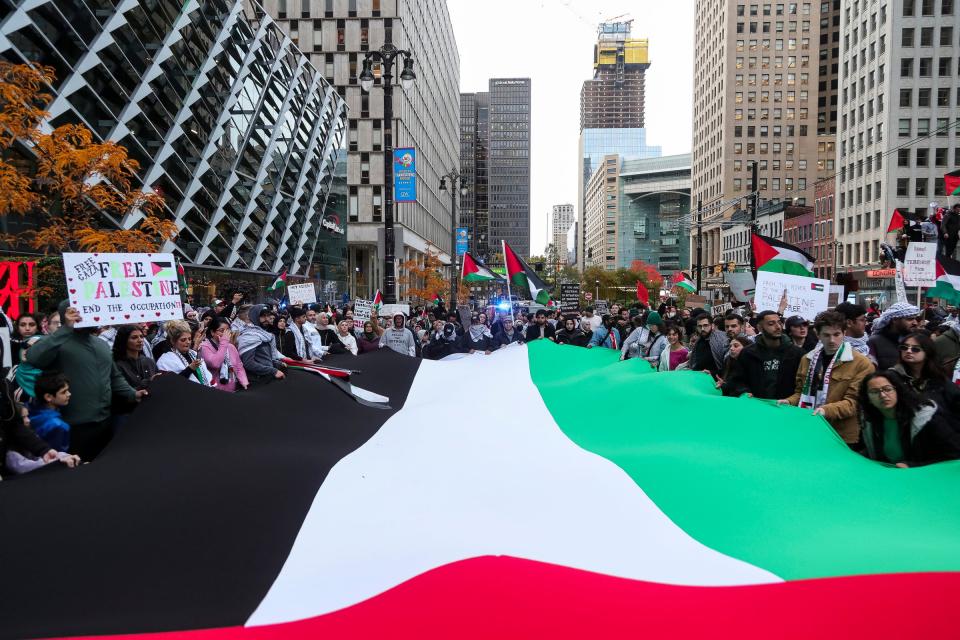
The Palestinian American community feels the pain of the war acutely, in part because of family connections to Palestine, said Arab American Institute co-founder and a Democratic pollster James Zogby. Palestinian families are often large and their emigration to the U.S. fairly recent, with most arriving after Israel's founding in 1948.
But anguish over the war on Gaza extends beyond those with ties to the territory, Zogby said.
"I call Palestine the wound in the heart that never healed," he said. "It's sort of the unresolved issue of the colonial era. Everyone got independence — Lebanese, Syrians, Jordanians … so it was an issue to the whole Arab world.
“And if it's felt by the rest of the Arabs, it's acutely felt by Palestinians.”
'Every day gets worse'
Shannan knew early on that the war would be the worst Gaza had ever seen — before her childhood home was destroyed, before the death toll in the enclave of 2.1 million soared over previous conflicts. It was her father’s silence that gave away the catastrophe to unfold. Stoic and reassuring through past wars — which Shannan endured alongside him in 2008, 2012, and 2014 — he now offered no words of comfort.
Israel vowed to destroy Hamas after a series of atrocities that included the killing of civilians at a music festival and kibbutzim — a massacre the country has likened to 9/11. It's unclear how many of the group's fighters have been killed; Gaza's health ministry says most of the war's victims have been women and children.
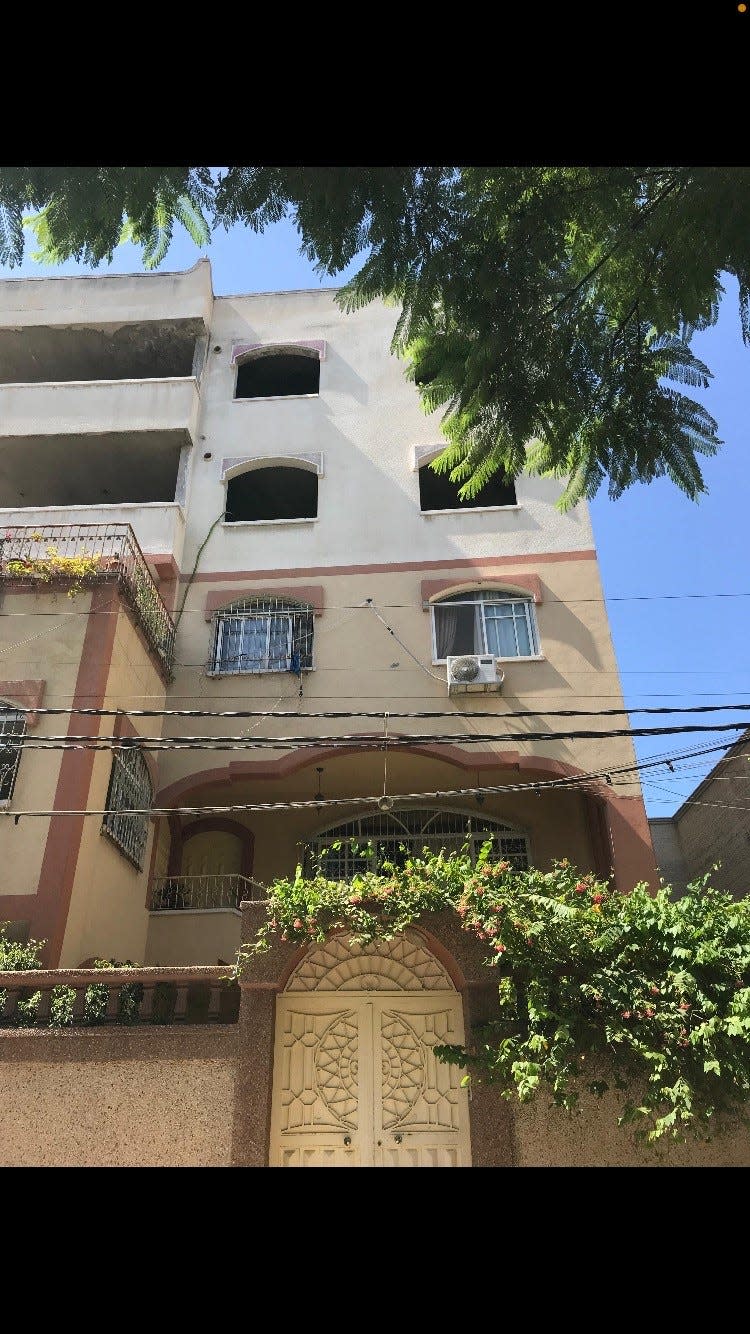
Shannan's family fled its Gaza City neighborhood — a district of shops and offices that is effectively the downtown of the Gaza Strip's urban core — when it came under intense bombardment early into the war. Though they'd stayed put through past conflicts, the extraordinary scale of the bombing prompted them to relocate by the war's second day — first to a relative's in a nearby city, then to the south after an evacuation order, she said.
In Dearborn, her body half a world away, Shannan’s mind has stayed with them.
Her fall break from the University of Detroit Mercy, where she studies computer science on a full scholarship, coincided with the war’s first week. Shannan canceled plans for a nearby vacation and instead spent the days glued to her phone, heartsick and lacking the energy to eat or fully care for her son, who's 3, she said. The typically straight-A student says her grades have since slipped, and that she fears she'll jeopardize her scholarship.
“I’m so anxious and so worried,” Shannan said. “Every day gets worse. I wake up multiple times at night — if I sleep — trying to see if they reply to my messages.”
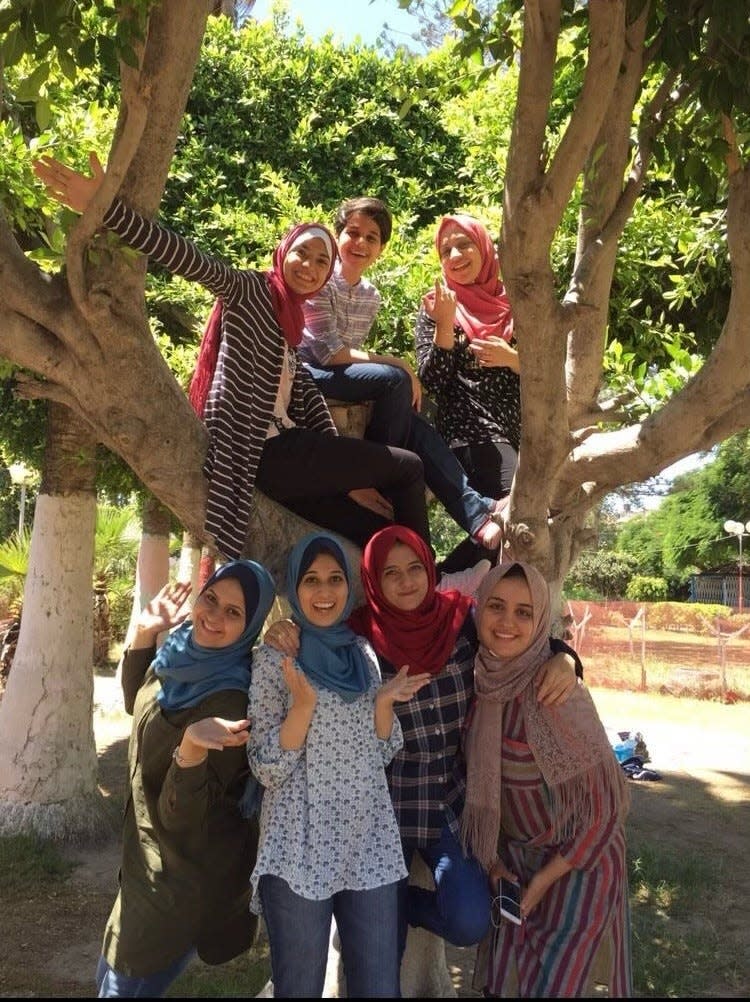
Communication is hindered by limited internet and power access, so Shannan keeps outreach to the point. About once a day, she conducts what can only be described as a proof-of-life check — sending an emoji to her family’s WhatsApp chat, or sometimes even only a dot, in messages shared with the Free Press.
As the hours wear on without response, her anxiety reignites. She says she tries to find solace in the double check mark showing her message was at least received, but at times goes to greater lengths to see whether her family is safe, asking others in Gaza to check on them or scanning siblings’ social media accounts for clues.
So far, each message has — eventually — received a response. “We’re fine,” they’ll say, or “Alhamdulillah,” meaning “praise be to God.”
Shannan can't bring herself to ask many questions. Her family, she said, likely wouldn’t share much, as they don’t want her to worry. But she also doesn't want to make them articulate an unbearable reality. The comforts they once knew in Gaza City — where she said they owned and operated a pharmacy — have been replaced by bread lines and the ever-present threat of death.
And anyway, the parts left unsaid are in the news: Ice cream trucks turned into makeshift morgues, children’s names etched on limbs so they can easily be identified if killed, mass graves that could hold loved ones — these are some of the images Shannan says haunt her.
Families packed together in homes in the south, like hers and her husband's, are in some cases reportedly being wiped out by a single bomb. Half the country’s structures are meanwhile damaged or destroyed, according to the United Nations, amid a worsening humanitarian crisis that has seen people storm the intergovernmental organization's warehouses in search of food and supplies.
“I cannot bring myself to ask them ‘are you guys OK?’ because I know they’re not,” Shannan says. “No one in Gaza is or will ever be OK again.”
Straddling homes
Shannan counts herself among the lucky ones. She became a U.S. citizen after leaving Gaza four years ago, escaping an area she says is "not really a place to live" or raise children.
Even for a better-off family like the one she came from, there’s limited opportunity. Gaza's jobless rate is about 50% and Israel's occupation presents a host of limitations, including on travel. When Aboushaban visited for their wedding in 2017 with the intention of staying just a few weeks, an unexpected blockade stranded him there for almost six months, costing him his job as a Chrysler engineer, the couple said.
Wars, meanwhile, have left Shannan with what she believes is PTSD. When she first moved to metro Detroit — to Dearborn Heights, near the airport — she said the sound of passing planes made her shake. Growing up, she said she’d known only the sound of Israeli fighter jets.
Still, she feels guilty for having left. Her eight younger siblings are like children to her, she says, and "I’d rather be there and scared with them than be here and scared for (them)."
And then she thinks of her new home, in Dearborn, and is hit by another wave of guilt. It's the one that called her back the night she mourned the loss of the home where she grew up. The one where her son required a bath and bedtime story and where, throughout the weeks of bombardment, he's asked what's wrong and if he's to blame.
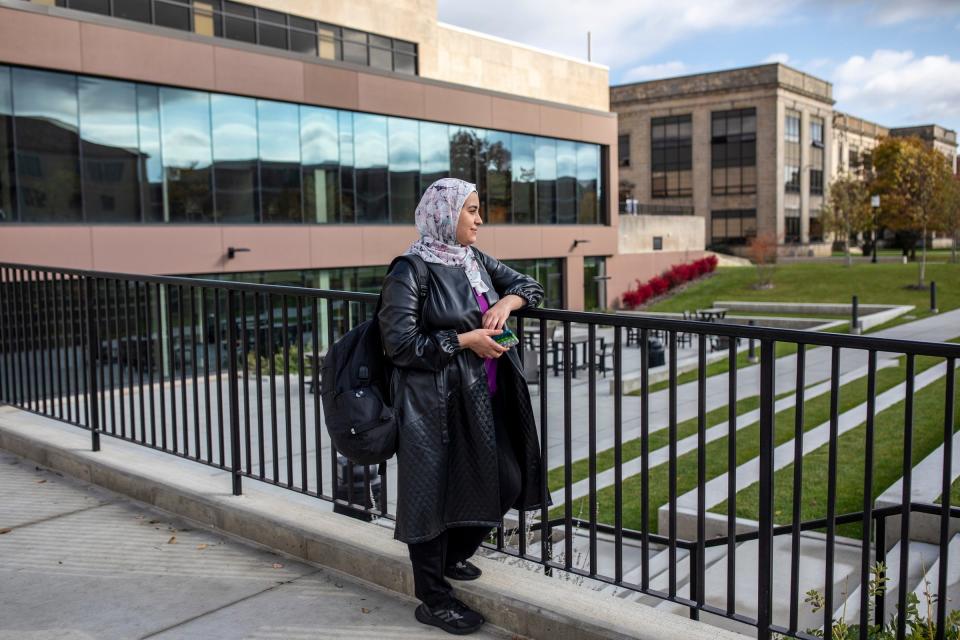
Shannan's sense that she's "doing bad at everything in life" has, she said, been relentless — "a sick thing."
Her husband has tried to help by covering more child care duties, his distress having somewhat abated since the war's onset, thanks to the distraction of work, he said.
Though he tries to provide emotional support too, he's at times found it difficult. When Shannan got word her house was lost, it was part of a bombing campaign that nearly wiped out Gaza City's Rimal neighborhood, where Aboushaban's mother also lived before evacuating.
"I kept trying to comfort her ... but it was kind of tough for me as well because I was shocked myself," he said. "I was really scared to be honest, it was really sad ... something of this magnitude was something I thought I would only see in movies."
Reprieve, Shannan said, will only come when the war ends. She doesn’t know when that will happen, how many people will have to die first — whether her family members will be among them.
All she can do, she says, is pray.
“I’ve been asking God to spare the lives of my family,” she said. “And I’m praying for strength for myself.”
Violet Ikonomova is an investigative reporter at the Free Press. Contact her at vikonomova@freepress.com.
The Free Press is committed to telling the stories of metro Detroiters directly impacted by the war in Gaza. To speak to a reporter, email gazawar@freepress.com.
This article originally appeared on Detroit Free Press: Dearborn resident from Gaza lost her home, fears losing family

